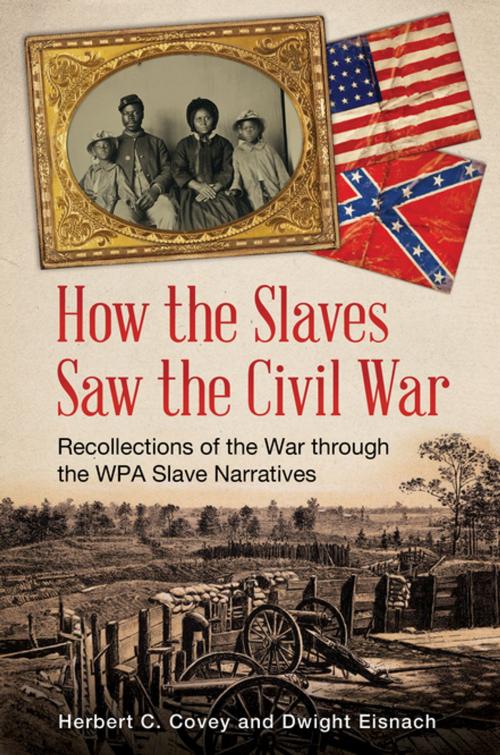How the Slaves Saw the Civil War: Recollections of the War through the WPA Slave Narratives
Nonfiction, Social & Cultural Studies, Social Science, Discrimination & Race Relations, Cultural Studies, African-American Studies, History, Americas, United States, Civil War Period (1850-1877)| Author: | Herbert C. Covey, Dwight Eisnach | ISBN: | 9781440828249 |
| Publisher: | ABC-CLIO | Publication: | January 27, 2014 |
| Imprint: | Praeger | Language: | English |
| Author: | Herbert C. Covey, Dwight Eisnach |
| ISBN: | 9781440828249 |
| Publisher: | ABC-CLIO |
| Publication: | January 27, 2014 |
| Imprint: | Praeger |
| Language: | English |
Examining narratives allows us to better understand what life was truly like for slaves: "hearing" history in their own words brings the human aspects of slavery and their interpersonal relationships to life, providing insights and understanding not typically available via traditional history books. How the Slaves Saw the Civil War: Recollections of the War through the WPA Slave Narratives draws upon interviews collected largely during the 1930s–1940s as part of the Federal Writers Project of the Works Progress Administration (WPA).
Because most slaves could not read or write, their perspective on the unfolding history of the war has been relatively unknown until these narratives were collected in the 1930s and 1940s. This book extracts the most cogent and compelling tales from the documentation of former slaves' seldom-heard voices on the events leading up to, during, and following the war. The work's two introductory chapters focus on the WPA's narratives and living conditions under slavery. The remaining chapters address key topics such as slave loyalties to either or both sides of the conflict, key battles, participation in the Union and/or Confederate armies, the day Union forces came, slave contact with key historical figures, and emancipation—and what came after.
Examining narratives allows us to better understand what life was truly like for slaves: "hearing" history in their own words brings the human aspects of slavery and their interpersonal relationships to life, providing insights and understanding not typically available via traditional history books. How the Slaves Saw the Civil War: Recollections of the War through the WPA Slave Narratives draws upon interviews collected largely during the 1930s–1940s as part of the Federal Writers Project of the Works Progress Administration (WPA).
Because most slaves could not read or write, their perspective on the unfolding history of the war has been relatively unknown until these narratives were collected in the 1930s and 1940s. This book extracts the most cogent and compelling tales from the documentation of former slaves' seldom-heard voices on the events leading up to, during, and following the war. The work's two introductory chapters focus on the WPA's narratives and living conditions under slavery. The remaining chapters address key topics such as slave loyalties to either or both sides of the conflict, key battles, participation in the Union and/or Confederate armies, the day Union forces came, slave contact with key historical figures, and emancipation—and what came after.










![Cover of the book Encyclopedia of American Civil Rights and Liberties: Revised and Expanded Edition, 2nd Edition [4 volumes] by Herbert C. Covey, Dwight Eisnach](https://www.kuoky.com/images/2017/september/300x300/9781440841101-OuYu_300x.jpg)




